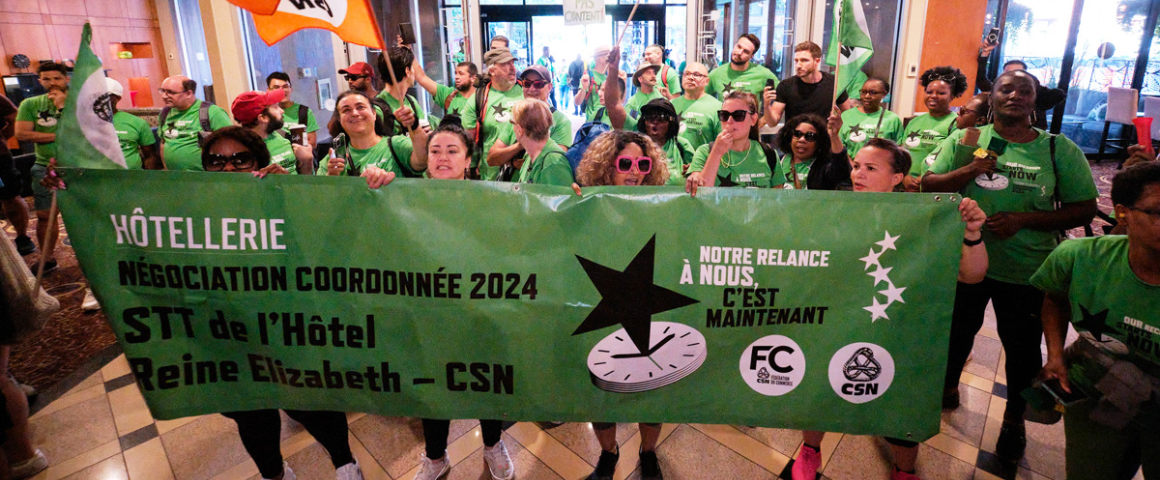By Maxime Bérubé
Hotel workers in Quebec have been negotiating since April 2024 and are facing major challenges. While hotel rates have skyrocketed, the appalling rise in the cost of living has hit workers hard.
Michel Valiquette, treasurer of the commercial section of the Confédération des syndicats nationaux (CSN) union and a worker in the sector for over 38 years, explained in an interview how the workers are standing up to management and their inadequate offers, using coordinated negotiations.
Under the CSN’s guidance, thirty union locals representing over 3,500 employees drew up a list of seven general positions while leaving individual unions the flexibility to make their own demands for their particular workplaces.
The first of the general demands was around wages: for an overall 36-percent increase, with 15 percent in 2024 and 7 percent in each of the following three years.
“At the last round of negotiations, in the midst of the pandemic, the workers agreed to an 8-percent increase over 4 years, before the rise in consumer prices and to give hoteliers some breathing space so that they could take advantage of a recovery,” said Valiquette, who added that the recovery happened quickly, “with room rates rising at a dizzying pace.”
“The workers enabled the hoteliers to make a fortune, but they in turn became poorer. We consider that the hoteliers owe a debt to the workers, and it’s in 2024 that they’re going to pay it. Our recovery is now.”
Another important point for the unions is staff training and retention. Hotels make little effort to retain staff, relying instead on employment agencies to fill gaps and thereby reducing general working conditions. The unions want to put an end to this practice.
“This demand is not against the workers of these agencies, who are often in precarious situations and even exploited. What we want is for them to be in our bargaining unit,” says Valiquette.
As far as training is concerned, it is currently provided by other workers on the floor, whereas Valiquette insists it should be provided by the employer through structured training programs. “People are often flung into their workplace without much supervision, so after 2-3 days, they leave even when working conditions are good.”
The unions are also looking to improve the vacation plan, proposing three weeks of vacation in the first year of service up seven weeks after 30 years. The unions are also calling for increased employer contributions to the group insurance plan, as well as a mechanism to measure workload in a consistent and non-arbitrary way.
The final point raised by Valiquette concerns revenue from tipping. Union members want to incorporate Section 50 of Quebec’s labour code into their agreement, to allow workers to decide on the allocation of tips. The restaurant sector is reportedly lobbying against this law, with bosses wanting to appropriate tips and decide how to divide them up. Incorporating the law into the agreement would guard against its repeal by a pro-business government.
“I applaud the willingness of workers to make this a priority, as they are often more concerned with service and pride in their hotel,” said Valiquette. “Whereas for the employer what matters is that the number in the right-hand column is green, no matter how you get there.”
Of course, these demands have been met with resistance from the bosses. As soon as negotiations hit the employers’ pocketbooks, things get ugly. That’s when the 30 unions have to use pressure tactics such as strike action – and that’s exactly where the power of coordinated bargaining lies.
Valiquette says that the practice of coordinated negotiations dates back to the 1990s and continues to evolve, reaching more and more union members who participate enthusiastically. “Hotels came into the CSN in the late 70s and early 80s, when you didn’t make a career in the hotel business – it was more of a side job. There was a union, but it was an American union that colluded with employers, and you got the minimum wage plus 10 cents with no other benefits.”
A decade later, coordination was taking shape. “We all had the same reality; we had everything to gain at that time because we were starting from nothing. So, if we agree on common demands, it will give us a good balance of power and all the victories are there to prove it – you can now make a career out of [hotel work].”
On the necessity of coordinated negotiations and the the exemplary level of organization and discipline it represents, Valiquette says simply: “It’s a model often imitated, but rarely equalled.”
Clarté – Translated from French by PV staff
[Photo: CSN]
Support working-class media!
If you found this article useful, please consider donating to People’s Voice or purchasing a subscription so that you get every issue of Canada’s leading socialist publication delivered to your door or inbox!
For over 100 years, we have been 100% reader-supported, with no corporate or government funding.




